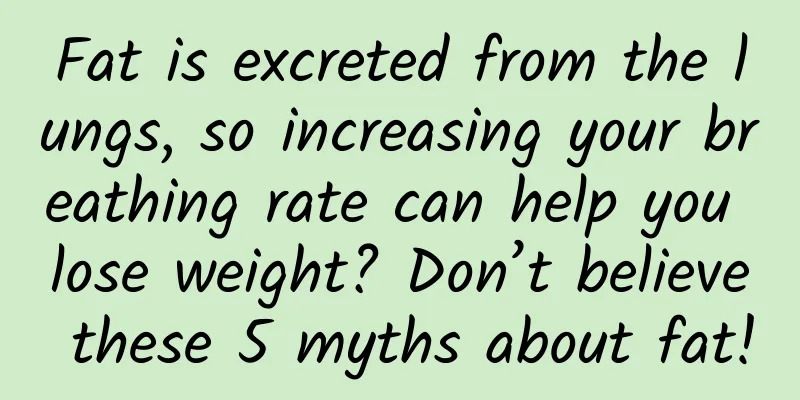Fat is excreted from the lungs, so increasing your breathing rate can help you lose weight? Don’t believe these 5 myths about fat!

|
When it comes to fat, everyone seems to hate it, believing that it will make people fat and ugly, and will also lead to chronic diseases such as the three highs. As a result, "weight loss" and "fat reduction" have become one of the hottest topics on the Internet. Therefore, there is a lot of knowledge and methods about weight loss circulating on the Internet, such as: Fat is excreted from the lungs , so increasing your breathing rate can help you lose weight; Fat is a combination of water and oil. If you want to lose fat, you have to drain the water first. Once the combination of water and oil is broken, the oil will be easier to lose. When the first thing you eat during the day is fat, your body will start to metabolize the fat first. · The first 20 minutes of exercise consumes sugar, and fat begins to be consumed after 20 minutes, so exercise will only have a weight loss effect after 20 minutes; · Fat burning has a fat burning heart rate. Buy a sports watch that can detect your heart rate and keep your heart rate within the fat burning heart rate range to lose weight. Are these claims reliable? How is fat formed in the human body and how is it metabolized and excreted? Today we will talk about fat. What is fat? People often say that they are too fat, have high blood lipids, or have heart disease, and they think that fat is definitely not a good thing. But in fact, fat itself is not a bad thing, but an essential nutrient for the human body. Fat, also known as triglycerides, is an important energy storage and energy supply substance in the human body. It is one of the three major energy supply substances in the human body, along with protein and carbohydrates. Fat is one of the essential nutrients for the human body, accounting for about 15% to 30% of the human body mass. Fat also plays a very important role in the human body, mainly including the following aspects: Provide energy: Fat is an important energy reserve. In long-term endurance exercise, fat is the main energy supplier. Every 1g of fat can provide 9kcal of energy, which is higher than carbohydrates. It is an important reserve energy reservoir for the body. Protecting organs: Fat is a protective layer for the internal organs of the body. It acts like a cushion to relieve mechanical shock and reduce friction between organs. The heart, kidneys, and reproductive organs are all protected by fat. It is precisely because of this fat cushion that the body is able to move. Absorption of nutrients: Fat-soluble vitamins require fat as a carrier for absorption, so insufficient fat intake may affect their absorption. · Endocrine: The raw materials of adrenal cortical hormones and sex hormones are fat. Adipose tissue itself has endocrine function and can secrete many hormones related to growth and metabolism. Women with too low body fat content will experience menstrual disorders and amenorrhea. How is fat formed? As long as people are alive, they need energy. Where does energy come from? It comes from the various foods we eat. Ideally, the energy we take in is equal to the energy we consume, so there will be no excess energy. But once energy intake exceeds energy expenditure, there will be excess energy, which will eventually be converted into fatty acids by insulin and combined with glycerol to form triglycerides, which enter the adipose tissue and are stored in fat cells. Over time, you will gradually gain weight. Moreover, no matter what this energy is, whether it is protein or carbohydrate, the excess energy will eventually be converted into fat and stored in the body. Therefore, eating too much of any food will make you fat, eating too much pork belly will make you fat, eating too much rice will make you fat, and eating too much French fries will also make you fat. It's just that some foods have higher energy, and eating a little more will consume a lot of energy, making it easier to gain weight. This is why eating fried chicken, French fries, and hamburgers is easier to gain weight than eating vegetables and cucumbers. Where does fat accumulate? Once our body has excess energy, it is stored in the form of fat in fat cells. The areas where the human body has more fat cells are mainly the thighs, waist, abdomen, buttocks and organs . This is why once you gain weight, your thighs and stomach tend to become thicker and bigger. If you gain weight to a certain extent, you will develop fatty liver. How is fat discharged? If you want to lose weight, you need to metabolize and consume the fat in your body and excrete it. So, how does fat leave our body? Many people regard the amount of sweat they sweat after exercise as a sign of weight loss, believing that sweating during exercise is a sign of fat consumption. There is even a saying that "sweat is the tears of fat." This is actually a common misunderstanding. Fat does not flow away from the skin surface like sweat. The main components of sweat are water and electrolytes, while fat is triglycerides. The main function of sweating is to dissipate heat and balance the body temperature within the normal range. The excretion of fat mainly depends on breathing and urine. When fat undergoes oxidative metabolism, the fat in the body will eventually decompose into carbon dioxide and water under the action of oxygen. These carbon dioxide are excreted from the body with our breathing, while water is filtered through the kidneys and eventually excreted from our body in the form of urine. The process of fat being metabolized and excreted requires a lot of oxygen, so aerobic exercise will be more effective in reducing fat and weight. Copyrighted stock images, no reproduction is authorized How to lose fat? When we talk about losing weight and reducing fat, we are referring to the fat in our body. If we want to lose fat, it means that we need to metabolize fat in our body. Under normal circumstances, fat cells will not decrease in size, but will simply expel the fat inside and become smaller. This is the fat metabolism mentioned earlier, which eventually turns into carbon dioxide and water and is excreted from the body, and the energy is consumed by us. This process is simple to say, but it takes a lot of physical effort to do it, because exercise is needed for fat metabolism to occur, and people also regard it as a "burning process." A large amount of oxygen is required for fat to be metabolized and consumed, so aerobic exercise is more effective in reducing fat. Therefore, if you want to lose fat, you need to persist in moderate aerobic exercise every day for a long time. These 5 myths about fat Is it true? 1. Fat is discharged from the lungs, so increasing breathing rate can help lose weight? This statement is wrong. Fat is not excreted from the lungs, but through fat oxidation and decomposition, which eventually produces energy, carbon dioxide and water, which are excreted through breathing and urine. If you only increase your breathing rate but do not exercise, there will be no energy consumption, no fat oxidation and decomposition, and you will not be able to lose weight. 2. Fat is a combination of water and oil. If you want to lose fat, you have to drain out the water first. Once the combination of water and oil is broken, the oil will be easier to lose? This statement is also wrong. Fat is not a combination of water and oil, but triglycerides. In order to lose fat, fat needs to be oxidized and decomposed, which eventually produces energy, carbon dioxide and water, which are excreted through breathing and urine. 3. If the first thing you eat during the day is fat, your body will activate the mechanism to metabolize the fat first? This is wrong. The body metabolizes energy substances such as carbohydrates and fats according to its needs, regardless of what the first bite is. 4. Sugar is consumed in the first 20 minutes of exercise, and fat starts to be consumed 20 minutes later. So exercise will only have a weight-loss effect after 20 minutes? This statement is not accurate. Glycogen is mainly consumed at the beginning of exercise, but fat consumption is continuous, not just after 20 minutes. 5. There is a fat burning heart rate for fat burning. If you buy a sports watch that can detect your heart rate and keep your heart rate within the fat burning heart rate range, you can lose weight? This statement is inaccurate. The concept of fat-burning heart rate does exist, but the weight loss effect depends on many factors such as the intensity and duration of exercise and personal physique, and is not necessarily related to heart rate. Planning and production Author: Ruan Guangfeng, Deputy Director of Kexin Food and Health Information Exchange Center Review丨Zhang Yu, researcher/PhD, Chinese Center for Disease Control and Prevention, national health science expert Planning丨Zhong Yanping Editor: Zhong Yanping Proofread by Xu Lailinlin |
<<: Curious questions for the Year of the Snake! Explore the most "snake"
>>: Stop complaining about me being unsophisticated, it's because I'm so charming
Recommend
What is the "crucifix" of solid-state battery performance degradation? "Artificial Intelligence Microscope" to find out
Produced by: Science Popularization China Author:...
Li Wei's tutorial video "Introduction to Web Front-end, Building a Website from Scratch"
Training course video content introduction: Intro...
How much does it cost to customize the Zhangzhou Electrical Mini Program?
The main factors affecting the price of mini prog...
Jixi watch mini program agent price inquiry, how much is the Jixi watch mini program agent price?
How much does it cost to be a Jixi agent for a wa...
Singularity iS6 will be launched at the end of the year with a pre-sale price starting at 200,000 yuan. The OEM factory is JAC Motors, just like NIO.
It has to be said that in the era of mobile Inter...
Tik Tok Promotion: The Secret of Tik Tok’s Recommendation Algorithm!
Algorithms are an indispensable evaluation mechan...
10 tips for selling products in live streaming!
1. Short video-live broadcast room resonance When...
Little Printf's Programming Story: Chapter 1
[[160813]] The original author, Fred Hebert, is a...
Science in Poetry | From firecrackers to guns and cannons, how did gunpowder change the evolution of human history?
New Year's Day (Song Dynasty) Wang Anshi The ...
5 practical cases of community operation!
Do you know which stage of community operation yo...
Android L update is coming but when can you enjoy it?
After Apple releases iOS 8, users can upgrade imm...
Google may disable fast charging technologies such as Qualcomm and MediaTek in future Android versions
According to a report by Android central, a well-...
Cold Clothes Festival丨The heat is high in July, and clothes are given out in September. Please put on more clothes when the weather is cold!
The first day of the tenth month of the lunar cal...
Guide to information flow placement in 5 major industries: channel strategies, advertising formats, and creative routines are all included!
Nowadays, mobile programmatic advertising is expe...
Apple hasn't announced its VR strategy, perhaps because the experience isn't good enough yet
If Apple announced a VR product, would you be a l...









